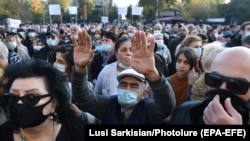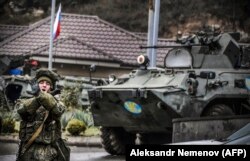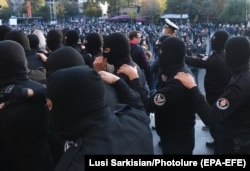He came to power in 2018 via massive, pro-democracy protests. And when, in October 2020, he appealed for Russia’s help in defending Armenia against Azerbaijan, Moscow declined. But does the Kremlin, Armenia’s closest regional ally, actually have a stake in using ongoing Yerevan demonstrations against the Nagorno-Karabakh peace deal to remove the pro-Western Armenian Prime Minister Nikol Pashinian from power? Analysts interviewed by Current Time mostly think not.
As they have since November 9, the day before the peace deal with Azerbaijan and Russia went into effect, thousands of protesters gathered on Friday, November 13 in downtown Yerevan’s Liberty Square to denounce the Moscow-brokered accord and call for the Armenian leader’s resignation, RFE/RL’s Armenian Service reported.
Aside from rage at the prime minister, whom they call a traitor for agreeing to Azerbaijan retaking control of the Karabakhi town of Shushi (Shusha in Azeri) and formerly Armenian-controlled territories adjoining Karabakh, a predominantly ethnic Armenian breakaway region, some protesters have taken aim at the European Union, United Kingdom, and United States, among other Western players, for not coming to Armenia’s aid when war with Azerbaijan over the territory resumed on September 27.
Russia declined to intervene when Pashinian appealed for its help in late October, stating that, per its defense treaty with Yerevan, it would only do so if an attack occurred on Armenia itself.
Some see that as a sign of the Kremlin’s distaste for the 42-year-old Pashinian himself, who has overseen criminal probes into the pro-Moscow ex-President Robert Kocharian as well as Yuri Khachaturov, head of the Russia-led military alliance, the Collective Security Treaty Organization.
Pashinian also has friendly ties with Western-financed non-governmental organizations and has not cracked down on media that criticize Russia, noted Ukrainian international-relations expert Iliya Kusa.
But that does not mean, some analysts underline, that Moscow supports protesters’ calls for Pashinian’s removal from office.
Pashinian’s resignation would not be to Russia’s advantage now because “it pledged to compel Armenia to fulfill its part of the deal,” observed Ihor Semivolos, director of Kyiv’s Near East Research Institute. Leaving Pashinian with the “bitterness of defeat” by Azerbaijan would be “better” for Moscow than taking the time to find “new partners” willing to execute the Kremlin-brokered agreement, Semivolos said.
"[I]n the situation at hand, it seems to me that Moscow is interested in Pashinian staying," he concluded.
Russia, touted by mainstream Russian media as having “saved” Armenia, has its prestige on the line. Under the terms of the November 9 agreement, hundreds of Russian army troops, equipped with armored personnel carriers, have flown into Armenia since November 10 for deployment as peacekeepers in Nagorno Karabakh.
It is fundamentally a trilateral deal, with no written anticipation of a role by the Organization for Security and Cooperation in Europe’s Minsk Group, the international body that has overseen negotiations on Karabakh for roughly 20 years, or any other international organ.
If Pashinian resigns, “we don’t know who will come” in his place to oversee the accord’s execution, stressed Aleksei Malashenko, a Near East specialist and director of research for the Kremlin-friendly Dialogue of Civilizations Institute in Berlin.
While Pashinian, a former journalist and opposition activist, may not have “a personal chemistry” with the Kremlin, he also has not espoused foreign policies based on “anti-Russian or Russophobic positions,” noted Sergei Markedonov, a senior researcher at the International Research Institute of the Russian Foreign Ministry’s Moscow State Institute of International Relations.
“Therefore, we need, obviously, to be ruled by logic,” Malashenko commented.
So far, no sign exists that Pashinian plans to resign over the protests, which, after the November 10 storming of parliament and government headquarters, prompted a government warning about a “coup” attempt.
Under Armenia’s current martial law, which went into effect when fighting began with Azerbaijan on September 27, the protests by Pashinian’s critics are illegal as are calls for officials’ resignations.
While the protests have no one clear leader, several opposition leaders and members have been brought in for questioning or detained (though some were later released) in recent days.
Parliament’s opposition does not have the seats needed (67) for a no-confidence vote in the prime minister to pass, however.
Nonetheless, Pashinian talking face to face with his critics, who include members of pro-European parties, has become “[v]ery important,” commented a former Ukrainian ambassador to Armenia, Oleksandr Bozhok, on November 13.
While Armenian President Armen Sarkissian , has met with some of the nearly two dozen parties taking part in the protests, the prime minister, to date, has not since the peace deal was signed on November 9.
“[H]e’s always trying to move away from such a meeting, from a public discussion,” Bozhok complained of Parshinian. “It seems to me that Armenia is now standing on the verge of very tumultuous events.”
By December 1, Armenia must surrender to Azerbaijan the Kelbajar, Aghdam, and Lachin regions, three of the seven Azerbaijani regions surrounding breakaway Nagorno Karabakh that have been occupied by Armenian forces since the 1992-1994 Nagorno-Karabakh war.
Azerbaijan also will retain control of the Karabakhi town of Shushi (Shusha in Azeri), located just 10 kilometers from breakaway Karabakh’s administrative center, Stepanakert (Khankendi in Azeri).
In anticipation of these changes, a flood of ethnic Armenians from both Karabakh and the surrounding territories are pouring into Armenia. As the BBC has reported, some of them have burned their houses before leaving to prevent Azerbaijani soldiers or returnees from using or taking the properties.
In a November 12 speech to the nation, Pashinian maintained that, given Armenia’s military losses against Azerbaijani forces, he had no choice but to sign Moscow’s peace accord and thereby protect the self-declared Nagorno Karabakh Republic from annihilation.
He downplayed the agreement, though, as providing “only a cessation of hostilities,” rather than “a substantive solution to the issue” of Karabakh’s status.
Meanwhile, President Sarkissian, who has served as Armenia’s ambassador to the United Kingdom and European Union, has begun to promote the Minsk Group, which France, Russia, and the United States co-chair.
On November 13, he urged the Minsk Group talks to continue, commenting that “only this group has a mandate to resolve this issue,” according to his press service.
If Russian Foreign Minister Sergei Lavrov senses that as a rebuke, he has not shown it. The French and U.S. Minsk Group co-chairs are expected in Moscow next week for consultation on the Karabakh peace agreement, Lavrov announced on November 12.
“We will inform them in detail how we’re deploying the peacekeeping force,” he said.
-With additional reporting from PanArmenian.net, RFE/RL, and TASS









Facebook Forum